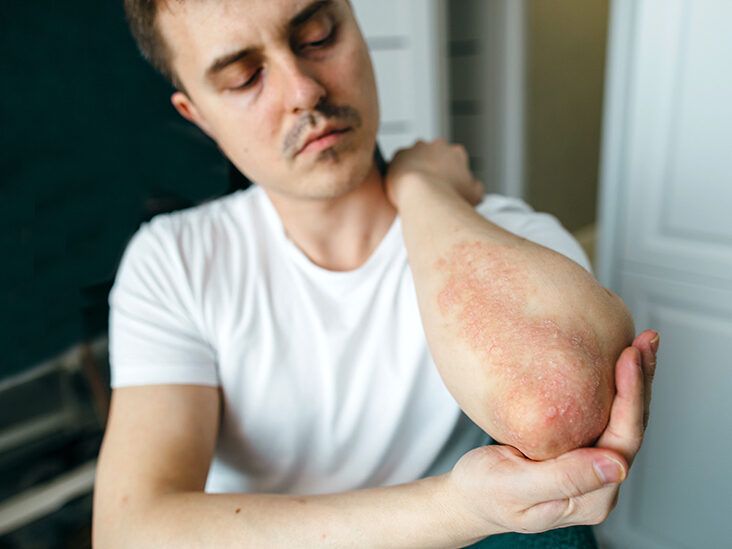A doctor may prescribe injectable treatments, such as methotrexate, TNF-alpha inhibitors, or interleukin inhibitors, for moderate to severe psoriasis when other treatments don’t work.
If you have moderate to severe psoriasis that hasn’t responded to other treatments, such as topicals, your doctor might recommend an injectable drug.
Injectable drugs such as methotrexate and biologics may help clear up plaques and reduce inflammation.
If you have moderate to severe psoriasis, psoriatic arthritis, or both, doctors recommend drugs called biologics. Biologics can be injected under your skin or into a vein.
Biologics often help when other treatments haven’t worked to treat psoriasis. They’re synthetic versions of proteins created from human cells that target specific parts of your immune system.
Biologics are some of the most effective psoriasis treatments. They block cytokines, which your immune system releases. Cytokines cause psoriasis-related:
- cell growth
- cell overproduction
- inflammation
Because biologic drugs target your immune system, they may increase your risk of infections. Side effects of biologic drugs may include:
- respiratory infections
- headaches
- flu-like symptoms
- swelling, itching, or a rash at the injection site
- urinary tract infection
Two types of biologic drugs are Food and Drug Administration (FDA) approved to treat psoriasis: TNF-alpha inhibitors and interleukin inhibitors.
TNF-alpha inhibitors
These drugs block a type of cytokine called TNF-alpha. The current FDA-approved TNF-alpha inhibitors are:
Interleukin inhibitors
These drugs block various forms of interleukin, another type of cytokine. The FDA has approved several interleukin inhibitors for psoriasis treatment:
Methotrexate was originally used to treat cancer but has been used to treat severe psoriasis for more than 50 years. It’s available in the following forms:
- injection
- oral tablet
- solution
Methotrexate slows down the growth rate of skin cells by binding to an enzyme that causes rapid skin cell growth and blocking its function. It typically clears plaques within 3 to 6 weeks after you start taking it.
If you’re just starting methotrexate, you’ll take 2.5 milligrams (mg) to 10 mg once weekly. If the weekly dose causes side effects, your doctor may prescribe 3 weekly 2.5-mg oral doses taken at 12-hour intervals.
Side effects and risks of methotrexate
Methotrexate may cause the following common side effects:
- loss of appetite
- nausea or vomiting
- stomach pain or indigestion
- diarrhea
- headaches
- drowsiness or tiredness
- hair loss
Taking folic acid may reduce some of these side effects. Ask your doctor about how much folic acid you should take.
Less commonly, long-term methotrexate use may cause liver damage or reversible liver scarring. Your doctor will order blood tests every few months during treatment to check how well your liver is working.
You should not use methotrexate if you’re pregnant or could become pregnant. This drug can harm your pregnancy.
Costs of biologics and methotrexate
Biologic drugs are effective at treating psoriasis, but they come at a steep cost.
According to research published in 2018, costs may range from $10,000 to $30,000 per year, with the most expensive options costing more than $500,000 per year.
Your methotrexate cost will depend on your regimen. Research from 2017 estimates that injectable methotrexate costs $59,058 on average and oral methotrexate costs $47,464 on average.
Under the Affordable Care Act, insurance companies must offer coverage for treating chronic conditions, including psoriasis. The amount your insurance company covers will depend on your plan.
Insurance companies often include expensive drugs such as biologics in the top tiers of their covered prescription drugs. These drugs tend to cost people more out of pocket.
Costs of biosimilars
Generic drugs often cost less than brand-name drugs. No generic versions of biologic drugs are available, but biosimilars, which are very similar to FDA-approved biologics, are available.
Unlike generic drugs, biosimilars are not exact replicas of the biologic drugs they’re based on. A biosimilar cannot be automatically substituted for a biologic drug.
But, like a generic drug, a biosimilar works in the same way as the biologic it’s based on, and it’ll be less expensive than that biologic. The FDA has approved biosimilars for:
- etanercept
- adalimumab
- infliximab
Talk with your doctor if you want to try a biosimilar drug.
While many psoriasis medications come as injections, apremilast is a psoriasis treatment that comes as a pill.
If you can’t take any of these medications or you’ve tried them and they didn’t work, other drugs that suppress your immune system may help. Talk with your doctor about all possible options.
For mild to moderate psoriasis, doctors often first prescribe topical treatments, which you apply to your skin. Some are even available over the counter. These treatments may:
- slow cell growth
- remove scales
- relieve itching and inflammation
Examples of topical medications include:
- Emollients: These products moisturize your skin.
- Steroid creams: These treatments reduce swelling and discoloration.
- Vitamin D analogs: These treatments slow the production of skin cells and reduce inflammation.
- Coal tar: This product reduces scales, itching, and inflammation.
Phototherapy (light therapy) is another psoriasis treatment. It exposes your skin to ultraviolet light to slow cell growth. Before phototherapy treatments, you may take a certain drug that makes your skin more sensitive to light.
Your doctor will recommend a treatment for your psoriasis. If your psoriasis is moderate to severe and other treatments haven’t helped, they may prescribe an injectable drug such as methotrexate or a biologic.
If you have mild to moderate psoriasis and you’ve tried biologics and other injectable drugs, you may still benefit from a topical medication. Another option is phototherapy.
Talk with your doctor about the benefits and possible side effects of your treatment options. Use this article to help you ask questions. Work closely with your doctor to find a treatment that works for you.
Connect with us
- Sign up for our Psoriasis newsletter.
- Join our Bezzy Psoriasis online community.
- Enroll in our psoriasis lesson.





